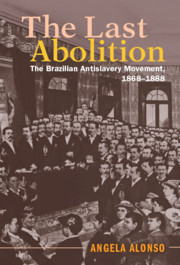
- Cited by 8
-
Cited byCrossref Citations
This Book has been cited by the following publications. This list is generated based on data provided by Crossref.
Lesser, Chris N. 2022. Another “education by stone”: An archaeological case study in Brazil's environmental law. American Anthropologist, Vol. 124, Issue. 4, p. 670.
Costa, Sérgio Rios, Flavia and Baldraia, Fernando 2023. Promises and Pitfalls of Intersectional Politics: The Black Coalition for Rights in Brazil. Social Sciences, Vol. 12, Issue. 12, p. 684.
Stanev, Mariane A. 2023. ‘715 haven street: art looks back’: the archival question of art resistance for abolitionist futures in a pacified present. Journal for Cultural Research, Vol. 27, Issue. 4, p. 313.
Eberl, Oliver 2023. The Palgrave Handbook of International Political Theory. p. 185.
Jansen, Jan C. and McKenzie, Kirsten 2024. Mobility and Coercion in an Age of Wars and Revolutions. p. 1.
Plaetzer, Niklas 2024. Insurgent legality: Luiz Gama’s plebeian republicanism between law and prefiguration. Contemporary Political Theory,
2024. The Cambridge History of Latin American Law in Global Perspective. p. 283.
de, Faria 2024. Democracy, the language of rights, coalitions and political system in Brazil. Drustveni horizonti, Vol. 4, Issue. 8, p. 73.
- Publisher:
- Cambridge University Press
- Online publication date:
- September 2021
- Print publication year:
- 2021
- Online ISBN:
- 9781108367394
- Subjects:
- Sociology of Race and Ethnicity, Area Studies, Latin American Studies, History, Latin American History
- Series:
- Afro-Latin America


